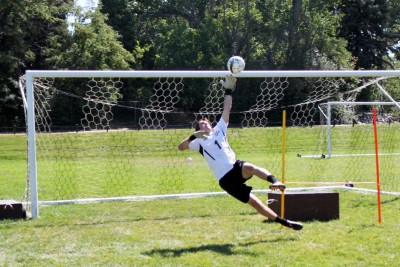Zuriel Lozano
Winning matters more than development
Few common statements, “Winning does not matter. What matters is players development.” Or, what about this statement, “it does not matter if we win or lose, as long as you have fun playing.” “Non-profit soccer organization dedicated to the mental, physical & developmental growth of a child”.
I’ve personally heard & read these statements numerous times in almost every youth club’s website’s “mission or vision statement” or soccer organizations. Non-Profit organization?? Don’t be naive, We ALL KNOW many who are currently profiting $$ from these youth soccer organizations. Someday these statements could possibly mean something, but not today!!!
 There are a number of wonderful coaches who dedicate lots of time developing players. Specially those coaches who KNOW they have struggling teams and they have no other choice than to develop the players to be able to compete.
There are a number of wonderful coaches who dedicate lots of time developing players. Specially those coaches who KNOW they have struggling teams and they have no other choice than to develop the players to be able to compete.
However, developing a player will take time to see results, but this is immediately overshadowed by game results. Meaning that if the team keeps losing games, most people equate these results with “NOT MAKING PROGRESS.” So, now coaches look like they are not doing their jobs.
Today, youth club coaches seem to be more concerned about their winning records, resumes & anything that can BOOST their personal coaching careers or boost the club’s reputation.
Think about this, if you are a “competitive youth club coach” do you want to be “THAT” coach who comes in last in the season and then be SENT DOWN to another level? NO WAY!!! Because of this, they will “win at all cost”. Therefore, for many of these coaches, “DEVELOPING PLAYERS” becomes almost a taboo and winning becomes a priority.
Stated facts expressed by many college coaches:
“College coaches/teams DO NOT have time to develop players, we need players ready to play as soon as they arrive.”
“In college, we need to win if we want to keep our jobs.”
Youth club level coaching:
“I will develop players but need to win this tournament or league”
“If I want to coach best teams, then I need better record”
Many coaches today would rather spend time with an athlete who requires very little attention and is already technically sound. After all, coaching a team full of talented players will make it easier to win games vs a team who has players that require attention to their skills. But wait, we are talking about a youth clubs here. In fact, YOU ARE PAYING THEM LOTS OF MONEY to TEACH your children, not to win matches, correct? even the best players in the world continue to get better every year.
So is competition not good for children?
I’m a true believer in competition. I was signed to play professionally at the age of 16 so competition was my way to put food on the table, for other athletes today playing professionally is simply the “cool thing to do”, to each his own. So i’m not speaking against competing. However, it seems as if, many local youth clubs and coaches are LASER-FOCUSED on competing & winning. I have LITERALLY seen coaches get UPSET when they lose a game or a 13 yr old player makes a mistake, this is demoralizing for any young player.
Development is the KEY of a successful athlete. However, the key of developing a players comes from the kind of coaching you are getting and the athlete’s desire to learn & get better. There will be PLENTY of competition later in life for these young athletes, so developing NEEDS to be a priority.
Few facts & research about development, winning & fun:
- Most people measure player success & development by the amount of games the team can win.
- 90% of kids want to play soccer because IT’S FUN. However, by the age of 13, about 70% of them will SLOW DOWN/ OR COMPLETELY STOP playing for organized sport teams, according to a research conducted by George Washington University.
- Today, many kids at a youth club level are told that the only way to be identified or RECRUITED by college coaches is by playing for a “higher level team” or “club,”. It’s no surprise why kids are playing under lots of stress to perform well and under intense parent’s supervision.
Playing for “higher level” teams is NOT THE ONLY WAY to be recruited by colleges, that’s a FACT…See our blogs!
- Encouraging kids to become better & to improve should ALWAYS be a priority over winning. However, our society views the number of wins, the goals scored & number of saves made as a “measuring stick”.
WE ALL AGREE, that it is NO FUN to be on the losing team or losing games all the time. On the other hand, is winning games a sign that your child is improving or developing? Think about it!!!
Here are few tips to help you with your development:
- If you are an athlete or a parent with a child who is already in a higher team, make sure your current training is pushing your MAXIMUM LIMITS & INTENSITY LEVEL. Many kids WILL PLATEAU early if you do not train at a certain pace. The competition is getting much higher ALL OVER THE WORLD. In other countries kids get signed into pro clubs early and by the time they are 18, they are powerful goalkeepers or field players playing at the highest level.
- Find sources outside your club to get high-quality training. Very soon, parents will NEED to really think about getting additional training, if you want your child to improve and be noticed by soccer programs. However, SOME Clubs DO NOT LIKE THIS, some of them will discourage this outside practices, either because they lose money or simply ARROGANCE. But you are responsible to take care of yourself.
- Understand goalkeeper & field players training in depth. If you’ve never been a goalkeeper, here is a tip: THERE ARE SO MANY TRAINING STYLES GLOBALLY. Today, there are so many clubs using old methodology mainly because the massive amount of goalkeepers and players in their program. If you are just a NUMBER in your programs you are NOT getting good training. Every individual is different so it requires a specific training method.
- IT IS ABSOLUTELY NAIVE, to think that YOUTH CLUBS can take care of hundreds of kids every week and provide an excellent training. In certain youth club training, you are just a “number” trying to squeeze through a session. You can’t possibly think this is great stuff? think outside the box.
In conclusion, today’s society is infatuated by quick, fast & short term results but this attitude could possibly shatter the athlete’s long-term possibilities to succeed. Most professional goalkeepers will reach their peak around the age of 32. But in the US, youth club soccer players are peaking at 17-18 yrs old and sometime even younger.
If you are a coach, goalkeeper, field player or parent reading this:
Your club’s number of winning seasons, state or national titles are completely USELESS for College coaches or Pro levels scouts. They only care that you are mentally strong, well developed, and ready to compete so that you can make a difference in THEIR teams.
More to explorer
Soccer parents, are you exhausted?
You seem to be living your life according to youth club soccer. An intense emotional roller coaster is experienced by parents throughout the United States as their children progress through their youth soccer careers. You may not think so, but being a youth soccer parent is exhausting emotionally and physically. Many parents have developed serious
Who stresses more during games parents or athletes?
Nervous soccer parents

Understanding Athlete Burnout
Athlete burnout is defined by Sport Psychologists as: physical/emotional exhaustion, sport devaluation, reduced athletic performance and accomplishment”. Burnout can happen at a very young age. I have personally met many 12-year-olds who show severe signs of burnout. Unfortunately, a number of parents refuse to believe their children are too young to burn out, insisting that what their children require is